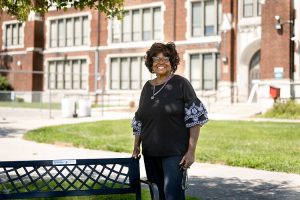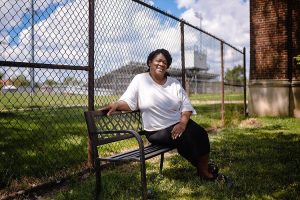SNAP-Ed program helps Detroit seniors improve dietary and fitness habits
August 12, 2020
 Summary: Detroit seniors are learning how to eat healthier and be more physically active through the SNAP-Ed program Fresh Conversations, a series of 60-minute programs that engage seniors in friendly dialogue about their health.
Summary: Detroit seniors are learning how to eat healthier and be more physically active through the SNAP-Ed program Fresh Conversations, a series of 60-minute programs that engage seniors in friendly dialogue about their health.
Challenge: Detroit residents face many challenges to healthy living. There are only 70 grocery stores in the city of 670,000 people, and not all of them are full-service, meaning that fresh fruits and vegetables may be hard to find or nonexistent. With a high poverty rate, many Detroiters cannot afford transportation to get to the nearest grocery store. Fast-food restaurants are much cheaper and easier to find, with nine to 10 fast-food restaurants for every grocery store. But the unhealthy options at those restaurants can result in high blood sugar, high cholesterol, obesity, and other health issues.
Solution: The Methodist Children’s Home Society (MCHS) in Detroit began offering Fresh Conversations in the spring of 2019. The program is funded with SNAP-Ed grants from Michigan Fitness Foundation. Sixty-minute Fresh Conversations program sessions for seniors are run by MCHS and are offered at community centers and other sites in Detroit. The program’s goal is to help seniors make changes in their diet and fitness routines to prevent chronic diseases and promote healthy aging. The sessions help promote healthy food and beverage choices.
 Led by Valerie Middlebrook, a retired high school teacher and former head coach of varsity basketball, track, and cross country, the classes include conversations about nutrition, healthy eating, demonstrations of low-impact exercises, and simple stretches participants can easily do at home. Each class includes a healthy recipe and a newsletter.
Led by Valerie Middlebrook, a retired high school teacher and former head coach of varsity basketball, track, and cross country, the classes include conversations about nutrition, healthy eating, demonstrations of low-impact exercises, and simple stretches participants can easily do at home. Each class includes a healthy recipe and a newsletter.
Fresh Conversations classes were held regularly until the statewide shutdown due to the coronavirus pandemic. Suspended for over 12 weeks, the classes resumed through telephone conference calls, offered twice a week. The ultimate goal remains helping senior citizens find ways to incorporate healthy food and physical activities that resonate with their lifestyle and enable them to make long-term changes.
“It’s truly a conversation. They’re not only learning from facilitators who run the classes but also from each other, from their peers in similar situations. They’re learning how their peers have incorporated healthy eating and physical activities into their lifestyles,” said MCHS Associate Director of Senior Programs Norvena Wilson.
Sustaining success: SNAP-Ed Fresh Conversations participants have reported that they continued to exercise on their own during the pandemic. They’ve also implemented many dietary changes that they learned from the SNAP-Ed programming. Participants have started cooking from home more frequently instead of relying on fast food, whipping up dishes like black bean burgers, oatmeal, and macaroni and cheese that uses cauliflower instead of pasta.
Before she joined the SNAP-Ed program, Fannie Johnson, 77, was overweight and battling high blood pressure and high cholesterol. Soda pop and other high-sugar foods were part of her daily diet. However, since starting the program, she’s no longer on medications for either condition, has lost weight, and no longer drinks soda. Johnson says she’s also seen lifestyle changes in her peers.
“My doctor, who told me to lose a little weight, can’t believe the change in me,” Johnson says. “Stopping pop was a really big thing. It has a lot of sugar, but I don’t drink coffee anymore either. I eat more vegetables and fewer sweets because I read labels.”

